
Chinese culture is famous worldwide for its rich flavors, diverse ingredients, and cooking styles.
Mastering some key Chinese food-related words and phrases will enhance your dining experiences and help you express your appreciation for the delicious dishes.
Useful Vocabulary
- 美味 (měiwèi) – Delicious
- 鲜香 (xiānxiāng) – Fresh and fragrant
- 爽口 (shuǎngkǒu) – Refreshing and crispy
- 滑嫩 (huánèn) – Tender and smooth
- 麻辣 (málà) – Spicy and numbing
- 清淡 (qīngdàn) – Light and mild
- 浓郁 (nóngyù) – Rich and strong (flavor)
- 软糯 (ruǎn nuò) – Soft and sticky
- 香甜 (xiāngtián) – Sweet and fragrant
- 回味无穷 (huíwèi wúqióng) – A lingering aftertaste
Interesting Facts
Regional Diversity
Chinese cuisine is incredibly diverse, with different regions offering unique flavors and specialties. From Sichuan’s bold, spicy dishes to Guangdong’s light, fresh seafood, each area brings its own unique taste to the table.
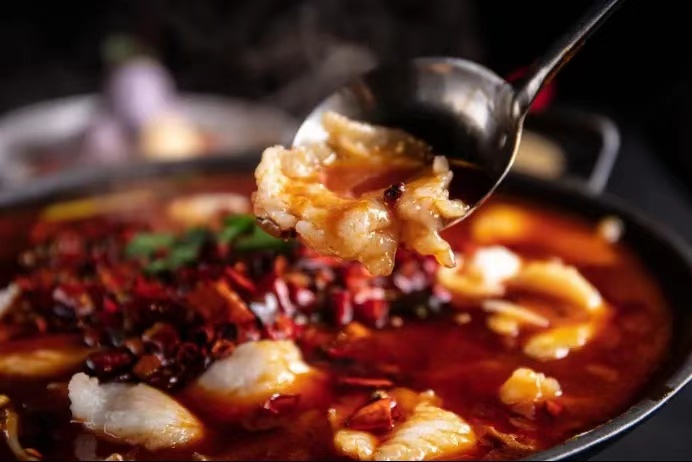
(水煮鱼片 (Shuǐ zhǔ yú piàn) – Boiled Fish Fillets in Spicy Broth)
Flavor Balance
Chinese cooking often focuses on achieving a harmonious balance of the five fundamental flavors: salty, sweet, sour, bitter, and umami. This balance is believed to promote health and well-being.(The Five Flavors: Sweet, Sour, Bitter, Spicy, and Salty)
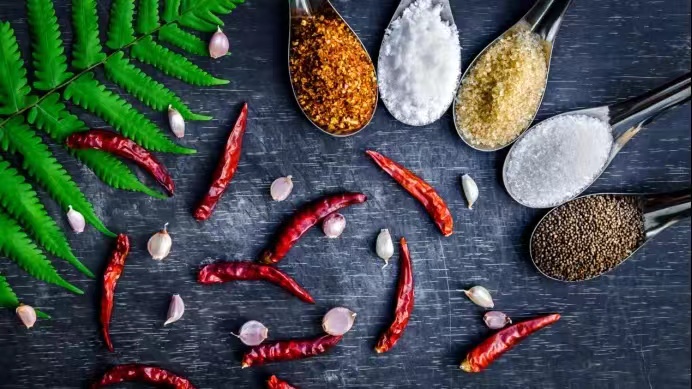
Culinary Techniques
The variety in cooking techniques, such as stir-frying, steaming, roasting, and braising, contributes to the complexity and depth of flavors in Chinese dishes.
Cultural Significance
Food is central to Chinese culture, with many dishes carrying symbolic meanings. For example, long noodles represent longevity, and round dumplings symbolize family unity.
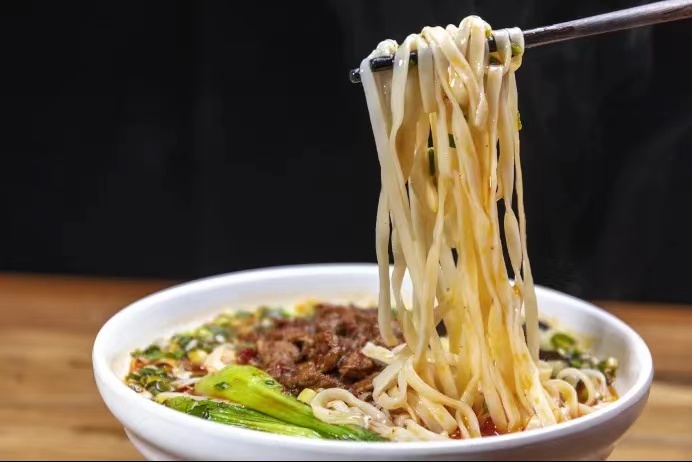
(On birthdays, Chinese people eat Longevity Noodles, which are long noodles that symbolize long life. It’s a traditional dish believed to bring health and longevity to the person celebrating.)
Healthy Eating
Traditional Chinese cuisine often includes fresh vegetables, lean proteins, and herbs, promoting a balanced and healthy diet. The use of herbs like ginger, garlic, and green onions is not only for flavor but also for their health benefits.
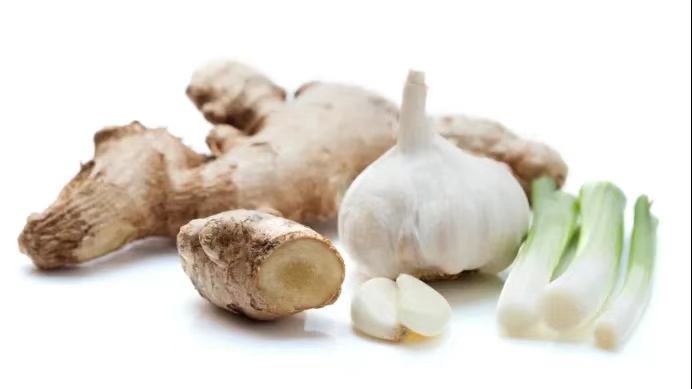
( Essential Trio of Chinese Cooking: Green Onion, Ginger, and Garlic)
Examples and Usage
1. Describing Taste
- 这道菜真美味!(Zhè dào cài zhēn měiwèi!) – This dish is really delicious!
- 麻婆豆腐有点麻辣。(Mápó dòufu yǒudiǎn málà.) – Mapo Tofu is a bit spicy and numbing.
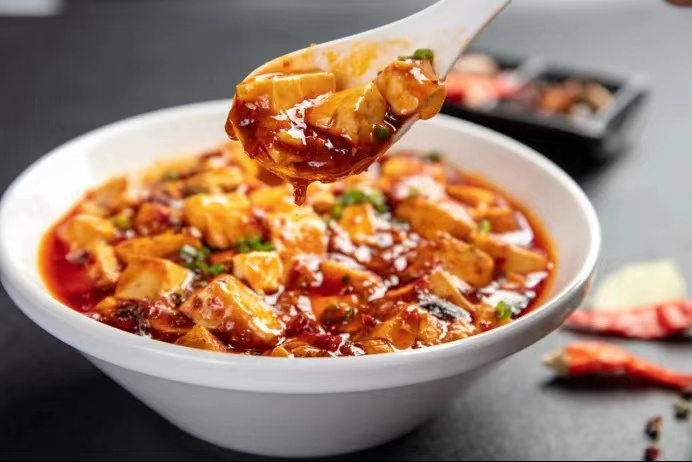
- ( Mapo Tofu: A famous Sichuan dish made with soft tofu, ground meat (usually pork or beef))
2. Expressing Preferences
- 我喜欢清淡的口味。(Wǒ xǐhuān qīngdàn de kǒuwèi.) – I like light and mild flavors.
- 他爱吃软糯的点心。(Tā ài chī ruǎn nuò de diǎnxīn.) – He loves soft and sticky desserts.
3. Talking About Dishes
- 北京烤鸭皮脆肉嫩。(Běijīng kǎoyā pí cuì ròu nèn.) – Peking Duck has crispy skin and tender meat.( Peking Duck,A renowned Beijing dish known for its thin, crispy skin and tender meat, often served with pancakes, scallions, cucumber, and hoisin sauce. )
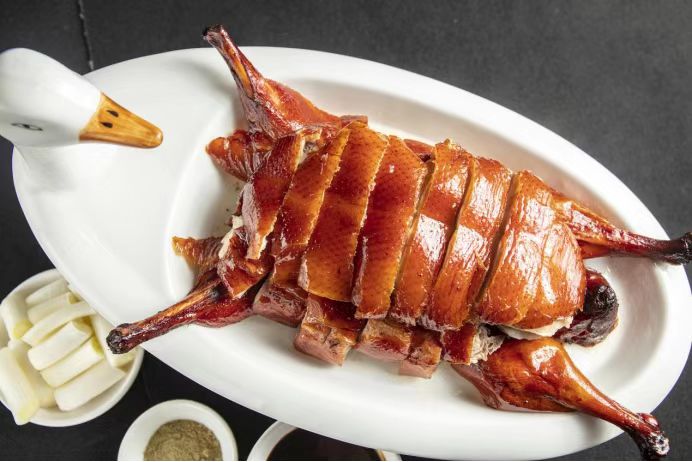
- 酸辣汤非常浓郁。(Suānlà tāng fēicháng nóngyù.) – Hot and sour soup has a very rich flavor.
4. Sharing Dining Experience:
- 这顿饭真是回味无穷。(Zhè dùn fàn zhēn shì huíwèi wúqióng.) – This meal has a lingering aftertaste.
- 那家餐馆的菜很爽口。(Nà jiā cānguǎn de cài hěn shuǎngkǒu.) – The dishes at that restaurant are very refreshing and crispy.
Rules of Usage
- Context Matters
- When describing food, it’s important to match the adjectives to the context. For example, “麻辣” (málà) is suitable for Sichuan cuisine, while “清淡” (qīngdàn) fits Cantonese dishes better.
- Use Cultural Sensitivity
- Some terms, like “麻辣” (málà), may have specific cultural or regional connotations. Be aware of these nuances to avoid misunderstandings.
- Express Your Preferences
- When dining in a Chinese setting, it’s helpful to express your taste preferences. Phrases like “我喜欢清淡的口味” (Wǒ xǐhuān qīngdàn de kǒuwèi) can guide the chef in preparing dishes to your liking.
- Understand Common Compliments
- Compliments like “这道菜真美味” (Zhè dào cài zhēn měiwèi) or “回味无穷” (huíwèi wúqióng) are polite ways to express enjoyment and appreciation for the food.
- Adapt to Regional Flavors
- Each region in China has its unique culinary style. Being open to trying new flavors, like the “麻辣” (málà) spice of Sichuan or the “鲜香” (xiānxiāng) of Jiangsu cuisine, will enrich your dining experience.
Dive into the world of Chinese Food with Mandarin Inn
Learning Chinese food-related words and phrases not only helps you order your favorite dishes but also enhances your understanding of Chinese culture.
Join us at Mandarin Inn to dive deeper into the rich and diverse world of Chinese cuisine and improve your Mandarin skills one delicious word at a time!
Enhance Your Mandarin Skills with Mandarin Inn
Ready to elevate your small talk game in Mandarin Chinese? Join Mandarin Inn and immerse yourself in a supportive learning environment tailored to your needs.
Our experienced instructors will help you develop practical language skills while exploring Chinese culture and customs. Start your journey to fluency today and unlock new opportunities for personal and professional growth!
Contact us now to learn more and embark on your Mandarin learning adventure! Free trial is also available, scan the QR code below to register!

Learn more about Mandarin Inn
Mandarinlnn对外汉语
Mandarin Inn offers various Chinese course programs, starting from 1-on-1 course, group class, to online class; everything is adjustable to your own schedule! Ready to dive deeper into the Chinese language and culture? Sign up for our courses at Mandarin Inn today and start your journey towards fluency. Let’s explore the beauty of China together, one word at a time.
-End-
Subscribe for fresh promotions and exciting events

Mandarin lnn对外汉语中心
Learn something about Chinese Culture, Language, Career development.

